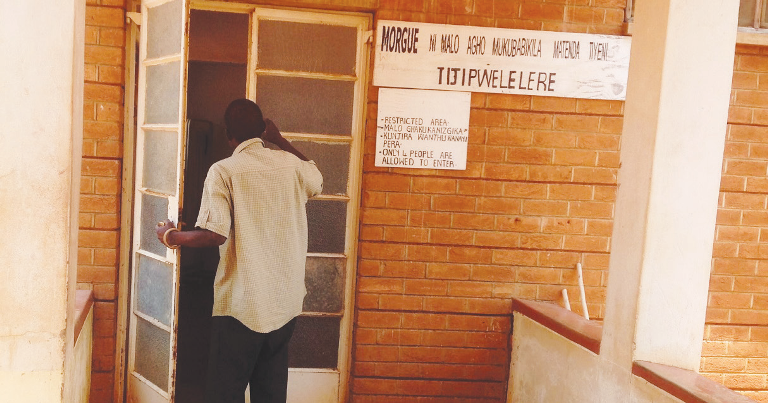Mortuary attendants in lucrative business
Public health facilities in Malawi care for patients for free but when they die, family members are responsible for bathing or embalming the bodies, the Ministry of Health has disclosed.
However, the ministry said embalming services at public health facilities are optional at a fee depending on materials used and family preference, but our findings have shown that no receipts are issued.

The ministry’s spokesperson Adrian Chikumbe said in a response to a questionnaire on Thursday that despite having a charge for embalming, it is optional and the ministry is aware of instances where some families cut corners to get the services.
Nation on Sunday findings further reveal that mortuary attendants have taken advantage of the situation and are embalming bodies at K65 000 and bathing them at K30 000, as per an official complaint lodged at Queen Elizabeth Central Hospital (QECH), which the ministry confirmed.
There have been complaints that people who take their patients to public health facilities knowing services are free; are made to pay after the loss of their loved ones to have the bodies bathed or embalmed.
Those with no money are made to collect the bodies in the state they are or could opt to do it on their own, with the public hospitals providing space and supervision only, according to Chikumbe.
Blantyre-based Vincent Shabani lodged a complaint with QECH after he paid K65 000 last Sunday after he lost his aunt, Maria Mdala.
He said he also made similar payments at Mangochi District Hospital and Zomba Central Hospital, but what surprised and forced him to take action was that he was not issued receipts.
He wrote QECH hospital management on September 6 2022 that he paid K65 000 for embalming as was demanded by a mortuary attendant, who was assisted by a guard to do the job.
Shabani in his complaint questioned the use of a private guard inside the morgue the amount he felt was exorbitant and the non issue of a receipt.
Chikumbe said he was aware of Shabani’s complaint through QECH management and they are looking into the matter.
He said: “However, I must be quick to mention that we keep dead bodies in our mortuaries before relatives collect them for burial. For those that want the bodies bathed [by themselves] before collecting them, we provide the required facilities for free and our personnel supervise.
“For those that died of highly infectious diseases, extra caution is taken to avoid further transmission of the disease to other people. Embalming services are optional and provided at a fee.”
Chikumbe also said their job is to keep the bodies in the mortuaries and release them when required.
He said: “Some relatives ask mortuary staff on a private arrangement basis. That is not official. Again, like I said, the embalming service is optional and, therefore, at a cost depending on cost of materials used.
“There are specialists who do this. However, many times the hospitals may not have these solutions used for embalming. As a result, desperate for the service, some relatives opt to cut corners and request mortuary staff to do what they can. This, however, is not official.”
Health activist Maziko Matemba said many complaints have been presented on the issue and urged government to put in place clear regulations regarding mortuary services.
He said: “The good thing is that the Malawi Health Act is being reviewed which the ministry can take advantage of to clear this issue.
“The ministry should have at the back of its mind that the law clearly states that no one should face hardship in the process of getting medical attention. Death comes after one has gone through the process of seeking medical attention; there is no need for bereaved families to feel that pain at the end of one’s life.”
The activist cited South Africa where special companies bathe and embalm dead bodies in public hospitals at a fee.
Matemba said mortuary attendants in Malawi’s public health facilities are taking advantage of the situation, using public infrastructure to run the lucrative business of bathing and embalming bodies.
He said: “If the services are offered at a fee, we expect the public health facilities to paste the charges on notice boards and issue receipts. With shortage of drugs in our hospitals, I see a situation where mortuary attendants would abuse chemicals used for embalming, or even source their own from outside as long as they know this is a good business.”





